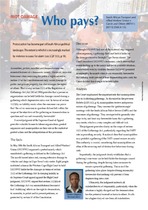| dc.contributor.author | Chigwata, Tinashe | |
| dc.date.accessioned | 2019-08-19T05:34:56Z | |
| dc.date.available | 2019-08-19T05:34:56Z | |
| dc.date.issued | 2011-11 | |
| dc.identifier.citation | Chigwata T 'Riot damage - who pays?' (2011) 13 Local Government Bulletin 9 | en_US |
| dc.identifier.uri | http://hdl.handle.net/10566/4790 | |
| dc.description.abstract | Protest actions has become part of South Africa's political landscape. The extent to which it is increasingly marked by violence is cause of alarm. Assemblies, pickets, marches and demonstrations are essential features of a democratic society. However, unlawful behaviour when exercising political rights set out in section 17 of the Constitution not only causes damage to public and private property, but also infringes the rights of others. To combat this behaviour, the Regulation of Gatherings Act 205 of 1993 was passed, which criminalises unlawful actions when exercising political rights. The recent judgment of the Supreme Court of Appeal provides valuable lessons to labour organisations, protest organisers and municipalities on their role in the context of protest action. This article seeks to analyse the court's judgment. | en_US |
| dc.language.iso | en | en_US |
| dc.publisher | Local Government Bulletin | en_US |
| dc.subject | Riot damage | en_US |
| dc.subject | Municipalities | en_US |
| dc.subject | South Africa | en_US |
| dc.subject | Regulation of Gatherings Act | en_US |
| dc.subject | Constitution of the Republic of South Africa, 1996 | en_US |
| dc.title | Riot damage - who pays? | en_US |
| dc.type | Article | en_US |

